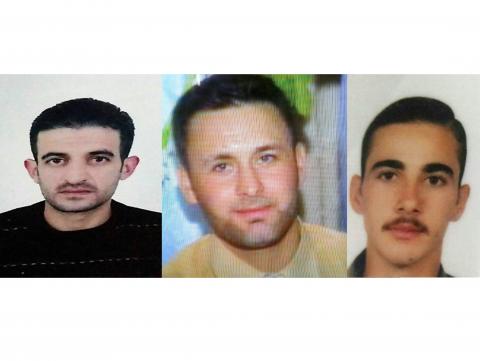
(L-R) Mohamad Tabanja, Ahmad Haj-Bakri, Ahmad Zanbelkji
On February 16, 2018, Alkarama and Human Rights Guardians submitted four more cases of individuals who disappeared following their arrests at checkpoints in Syria to the United Nations Working Group on Enforced or Involuntary Disappearances (WGEID).
Brothers-in-law Ahmad Haj-Bakri and Mohamad Tabanja, as well as Mohammad Shakra and Ahmad Zanbelkji have remained missing since their abductions at checkpoints in both the Latakia governorate – the government's northwest stronghold – and the Rif Dimashq governorate between 2012 and 2013.
In Syria, enforced disappearances are used systematically as a weapon of war. Since the escalation of fighting between the Assad regime forces and rebel groups, checkpoints have become the location of regular abductions and enforced disappearances carried out by soldiers, intelligence officers and militiamen.
On June 3, 2012, 33-year-old Ahmad Haj-Bakri and his brother-in-law, 36-year-old Mohamad Tabanja, both of whom worked as labourers, were stopped at a checkpoint under the control of the Military Intelligence while in a shared taxi on its way to Latakia industrial city. The officers arrested all passengers travelling in the vehicle, and Haj-Bakri and Tabanja were both taken to an unknown location while their family was left without any information on their fate and whereabouts.
In a similar case, Mohammad Shakra, a 34-year-old tile setter, was driving to Latakia with his two brothers-in-law and their wives on July 1, 2012. After reaching a checkpoint run by members of the Military Intelligence at the entrance of the village of Demsarkho, north of Latakia, the three men were arrested. The family did not lodge any complaints out of fear of reprisals.
As for Ahmad Zanbelkji, a 33-year-old taxi driver, he was abducted by the Syrian army at a checkpoint at the entrance of Yabrud – a city located halfway between Homs and Damascus – and taken to an unknown location. His wife enquired about his whereabouts at the military police station in Qabun, where officers told her that they were not permitted to tell her where her husband was detained.
Concerned over the fate and physical integrity of the four men, Alkarama and the Human Rights Guardians sought the intervention of the WGEID in order to shed light on the circumstances surrounding their disappearances.
For more information or an interview, please contact media@alkarama.org (Dir: +41 22 734 1006).
